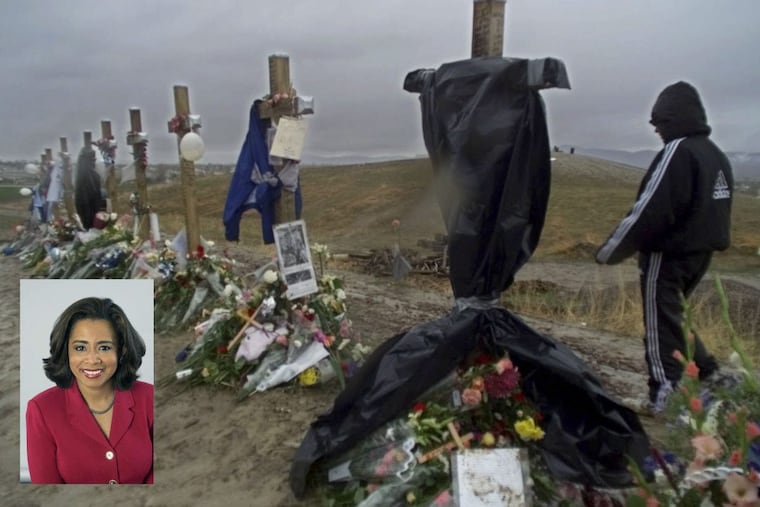Littleton native Renee Chenault-Fattah on Columbine anniversary: 'Not enough has changed.' | Perspective
Like all the other towns that would see mass shootings in the years to come - Nickel Mines, Newtown, Blacksburg, Parkland - people kept saying, "things like this just don't happen here."

I spend a lot of time thinking about the power of memory as part of a documentary project I am doing on Alzheimer's. Some memories are fleeting, while others, no matter how long ago, remain as fresh and as painful as the day they happened.That's how I remember Columbine, even now, 19 years later.
I grew up in Littleton, Colo., just a few miles from Columbine High School. I got the news of the shootings on a sunny Tuesday — funny what you remember — as I was driving from my home in Newtown Square into work at NBC10 in Bala Cynwyd and heard the radio news report: multiple shootings at a high school in Littleton. When it was over, two students had shot and killed 12 of their fellow classmates and a teacher before killing themselves.
By the time I got to the station where I coanchored the early and late evening newscasts, I was told to go home and pack a bag. I was heading to Littleton. My daughter was just 6 months old, but I knew doting grandparents would be waiting for us when we got off the plane.
I should have joyful memories of the first time taking my newborn home to the place where I grew up, but that tragedy in Littleton hung heavy in the air and colored everything.
Like all the other towns that would see mass shootings in the years to come — Nickel Mines, Newtown, Blacksburg, Parkland — people kept saying, "Things like this just don't happen here."
In the days to follow we did several stories close to a park not far from Columbine. Everywhere I looked, crying children and parents clustered together reading posted tributes. Photographs of smiling young faces were almost submerged by the mountains of flowers and candles.
Now, in the wake of America's many mass shootings, those memories show an all-too-familiar scene.
I tried locating high school classmates with whom I had long since lost touch — remember, this was pre-Facebook days — and while I was a new mom in my 40s, many of the kids I grew up with had kids who were now teenagers and had friends at Columbine High.
Those conversations led me to Michael Shoels, the father of Isaiah Shoels, one of the few black students at Columbine and the only black student killed that day. Shoels believed his son was targeted because he was black. His fears were later confirmed by other kids who were with Isaiah in the library when he was gunned down. I remembered telling Shoels I knew what it felt like to be "the only one."
For all those reasons and more, objectivity was impossible. I cried constantly. I held it together during my live shots, but I remember the tears returning every time I looked west toward the Rockies. It had always been a stunning backdrop for an idyllic childhood of good neighbors, ski trips with family, and horseback riding through open fields. Because of the shooting, those memories of Littleton were forever changed.
And yet not enough has changed to make our children safer. The shootings continue. Solutions are offered. For example, after Australia's mass shooting, the government banned assault weapons and the carnage stopped, a point passionately made by the Parkland high school students at the White House this past February. Their activism gives me hope even though their proposed solutions are often dismissed as unrealistic and even un-American because of how much this country loves guns.
I believe we should love our children more. We are not doing everything we can to protect them. In fact, it is the opposite. Congress allowed the assault-weapon ban to end without reauthorization. And the impact is not just in our schools. Recent data support a report in the American Journal of Public Health that the United States has a higher rate of police shootings than the rest of the world because we have more guns, which make cops more guarded and more likely to shoot.
We can learn from memory and yet we seem hell-bent on ignoring its lessons. And until we do, we are left with our memorials, our tributes, and our memories.
Renee Chenault-Fattah is a lawyer and former TV broadcaster now working on a film on Alzheimer's and dementia in communities of color.